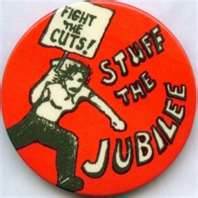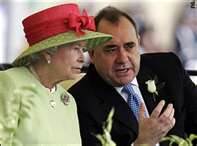Allan Armstrong will be introducing the workshop on Republicanism at the Radical Independence Conference in Glasgow on November 24th, along with Neil Davidson of the SWP, Graham McIver of Solidarity, and a speaker from Republic Scotland. He has been asked by the conference organisers to prepare an outline of his talk, so that those attending are better prepared for the workshop discussions. Here is Allan’s contribution. The full list of workshops and other conference arrangements can be found at:- http://radicalindependence.org/
Genuine Self-Determination Means Acting As Republicans Now

Most people understand a republic to be a state without a monarch. When socialists are asked why they oppose the British monarchy, they usually concentrate their criticism on the antiquated class structure this upholds; and the high cost of maintaining such a parasitic institution, especially now the rest of us face austerity.
However, the UK is a constitutional monarchy[1]For a socialist republican history of its development see:- THE MAKING AND THE BREAKING OF THE UK STATE. This means the queen exerts little power in her own right. The fragility of royal political influence was shown over the Windsors’ inept handling of the ‘Princess Di Affair’ in 1997. Yes, the royal family enjoys obscene privileges in terms of property, income and status, but these are rewards given for its role in supporting and promoting the interests of a wider British ruling class.
Far more important than the royal family itself, is the political system it fronts. Despite the existence of a parliamentary democracy centred on Westminster, with its devolved offspring at Holyrood, Cardiff Bay and Stormont, we still face very real political constraints. These lie in the state’s profoundly anti-democratic Crown Powers.
These powers shield a whole host of unsavoury institutions and practices from any public accountability or even scrutiny. They are needed to guarantee continued British ruling class control. This class is made up from the leaders of finance, commerce, industry, the armed forces, judiciary, senior civil servants and key politicians.
In 2004, the New Labour government deigned to publicise some of these powers. However, they still kept others secret – so we don’t even know the full extent of what we are up against! New Labour regularly resorted to these powers, most notoriously in the war in Iraq. A Labour government used these powers to mobilise troops to try to break the firefighters’ strike in 1977 .
These powers cloak the activities of the City of London in secrecy. Business leaders have also ensured that bidding and contract details for the government’s many lucrative PFI contracts, amounting to billions of pounds of public money, are conducted in secret under the guise of commercial confidentiality. This means that whole swathes of the UK economy, ostensibly under the control or supervision of Parliament, in reality lie way beyond any effective public accountability.

We can also look at other measures sanctioned under the Crown Powers. Last month, Guardian journalist, Ian Cobain, published Cruel Britannia: A Secret History of Torture. This shows how the UK state has been able to cover up its continuous use of inhuman treatment, and falsely claim it is not engaged in such practices.
Under the Crown Powers, even democratically elected governments can be toppled. Back in 1975, Gough Whitlam fronted a mildly reforming Labour government, which wanted to keep US nuclear warships out of Australian ports. He felt the long arm of the Crown Powers when the British Governor-General removed him from his elected office. The incumbent British Labour government did nothing to help, highlighting Labour’s almost total acceptance of the UK’s undemocratic state.
In 1999, under New Labour, the Crown Powers were used to deny the right of the Diego Garcia islanders to return to their Indian Ocean home, when they won their case in the British High Court. Unfortunately for them, Diego Garcia is now the site of a major US military base.
However, these powers go even further. They even allow for the suspension of Parliament in ‘extreme situations’, with resort instead to direct rule by the Privy Council. This very select band of former and existing senior government ministers is chosen for its reliability in upholding ruling class interests. Its members all enjoy close contact with the world of business, whilst some have had direct dealings with military officers, MI5 and MI6.
But surely such a constitutional coup is unlikely to ever happen? Yet, whenever national democratic challenges are made, the British ruling class quickly resorts to the Crown Powers. This should send out warning bells now that the prospect of greater Scottish self-determination has been raised.
In 1969, the UK state refused to make any serious attempt to dismantle its sectarian ‘apartheid’ statelet in Northern Ireland, when challenged by the Civil Rights Movement. After forcing this movement off the streets by gunning down 13 unarmed demonstrators in Derry in 1972, the full force of her majesty’s regiments was brought to bear on Irish republicans and nationalists. This included the SAS, the UDR (with its royal patronage) the RUC, and the Loyalist death squads, all backed up by juryless Diplock Courts, manned by Unionist judges, and by detention as required in ‘her majesty’s’ special prisons. Those sections of the state, which provide the ruling class with legal sanction to pursue its own ends, are prefixed ‘her majesty’s’ or ‘royal’. Self-styled Loyalists include those who are prepared to undertake certain illegal tasks when called upon by the security services.
But, surely we can take some comfort from the fact that the British ruling class did not resort to such violent measures when the issue of Scottish self-determination was raised in the late 1970s? However, before the mid 1990s, when the majority of the British ruling class concluded that ‘Devolution-all-round’ (for Scotland, Wales and Northern Ireland) was the best strategy to defend its interests in these islands and the wider world, many were bitterly opposed even to very mild constitutional reform.
Therefore, in the lead-up to the 1979 Devolution Referendum, the ‘non-political’ Queen was wheeled out to make a Christmas broadcast attacking Scottish nationalism. Senior civil servants were told to ‘bury’ any documents, which could help the Scottish nationalists. Military training exercises were conducted, targeting putative armed Scottish guerrilla forces. The security forces became involved on the nationalist fringe, encouraging anti-English diatribes and actions, to discredit any notion of real Scottish self-determination. But, it was not necessary to resort to more of the Crown Powers, because the Labour government was divided, and the SNP’s challenge was so mild and constitutionalist, the ruling class did not have to go any further.
Today, the British ruling class is even more united in its opposition to the SNP government’s ‘Independence-Lite’ proposals. There is no room, at present, for the SNP’s wannabe Scottish ruling class junior managerial buyout of the local branch of UK plc. This despite their acceptance of the monarchy and hence the continued ability of the UK state to intervene in Scotland; of NATO and hence a continued Scottish commitment to US and British imperial wars; and of the City of London and hence continued imposed austerity.

So, how will the British ruling class use those Crown Powers in the current referendum campaign? Well, they have already achieved their first objective. Alex Salmond, a Privy Councillor, sees his power coming from the devolved Holyrood office he already holds. He does not contemplate any ‘Yes’ majority, in 2014, leading to the setting up of a democratic Constituent Assembly answerable to the people of Scotland.
The Scottish government sees a ‘Yes’ vote as giving them a mandate to negotiate over how much more power can be devolved from Westminster. Their initial opening negotiating gambit of ‘Independence-Lite’, meekly accepts those profoundly anti-democratic powers and practices. They would become hardwired into any future ‘Scottish Free State’. And before this, you can be sure that the Unionists will force further retreats. The Crown Powers would also lead to certain hidden agreements – and we know that Salmond has a strong penchant for secrecy!
This means that socialists must not relegate the issue of a republic to a possible future referendum. Effective republicanism means opposing those Crown Powers today. If we want to achieve genuine self-determination or ‘Independence-Max’, our campaign must be republican from the start.
Allan Armstrong is a member of the Republican Communist Network and is on the Editorial Board of Emancipation & Liberation. He is also a member of the SSP’s International Committee. He has written From Davitt to Connolly, and is soon to publish the Ghost of James Connolly (about Connolly’s years in Edinburgh). He is also a contributor to the pamphlet, Republicanism, Socialism and Democracy and to the forthcoming book, Unstated – Scottish Writers and Independence.
Also see Republicanism and the Democratic Road to Socialism by Bob Goupillot.
Footnotes
References
| ↑1 | For a socialist republican history of its development see:- THE MAKING AND THE BREAKING OF THE UK STATE |
|---|
